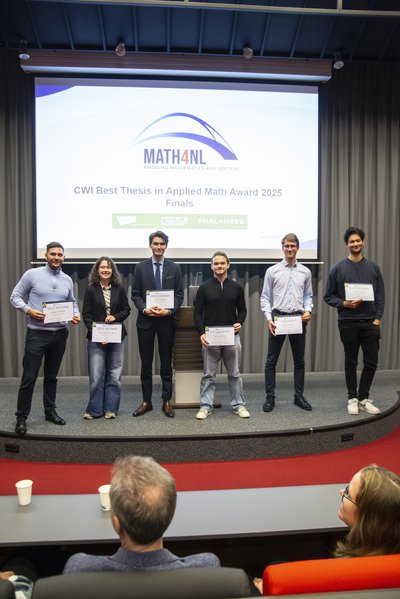As always, the finals displayed a wide variety of industrial and societal challenges where mathematicians make a difference: from neonatal care to selecting highlights in sports games and from conveyor belts to flooding. This broad range of applications was further highlighted in the talks from the sponsors. Besides CWI, ChipSoft and Phalanxes, also showed how they use mathematics in their daily work to solve real world problems. As such, the finals event is a yearly showcase of what mathematics can deliver. At the same time, it is also a way to welcome a new generation of applied mathematicians.

“There is a trend towards ever higher quality in the submissions,” remarks Mark Roest, chairman of the Innovation Committee of the Dutch Platform for Mathematics, who was ultimately responsible for the organization of the award. “This may point to a growing quality in the education, but it may also mean that the award has reached a standing where only those students submit that are really confident that they are among the best. In any case, this is a good sign for applied mathematics in the Netherlands.”
Winner of the Bachelor of Science award
In the BSc-category, Rick Scheper from NHL Stenden University of Applied Science won the prize for his thesis on “A Physiologically Based Pharmacokinetic Model of Nadroparin,” which he did for Universitair Medisch Centrum Groningen. The jury in particular valued the way his work combines comprehensive biomedical insight with precise mathematical modeling to address a medical and socially relevant problem.
The resulting model provides a solid foundation for improving anticoagulant dosing in neonatal care, where empirical methods often fall short, and illustrates the reach and impact that mathematical methods can have in advancing medical research and patient care.
The jury also appreciated Rick’s clear and engaging presentation, in which he convincingly explained the motivation, application domain, and key results of his research, guiding the audience through a complex topic with good visual support.
The other two candidates for the BSc prize were Bart de Beus from Amsterdam University of Applied Sciences, who investigated the effect of changing the method for assessing flooding risk at Waternet, and Kumar Sardjoe from Amsterdam University of Applied Sciences, who developed a method to automatically extract highlights in a sports game from NHL tracking data for Beyond Sports.
Winner of the Master of Science award
Daniel Cortild from the University of Groningen was awarded the MSc prize for the development of a global optimization algorithm for minimizing nonconvex functions that occur in predicting and controlling energy supply and pricing at EDF. The jury selected him because his work addresses a very hard problem with very elegant mathematics. Also, his solution allows applications in many other applications beyond the one for which it was developed and therefore has general relevance. This is illustrated by the fact that his work was recently published in a journal on machine learning.
In addition to the quality of the work itself, Daniel managed to clearly present it in the ten-minute pitch. He wisely decided to talk less about the mathematical details and more about the relevance of his work and the overall approach. The jury appreciated this, as it clearly shows that Daniel understands how to bring his rather theoretical work across to a general audience.
The other two candidates for the MSc prize were Hennes Vermeer from Delft University of Technology, who worked on the valuation of inflation-indexed derivatives for KPMG, and Lieke van der Linden from Delft University of Technology, who worked for VORtech on model order reduction of the differential algebraic equations for conveyor belt systems.
The award is organized by Math4NL on behalf of the Dutch Platform for Mathematics.
